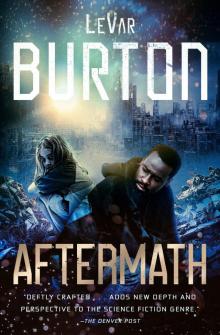- Home
- Andrea Cremer
Invisibility Page 3
Invisibility Read online
Page 3
I need to test this theory. I wait until it’s late, until I’m sure that she’ll be asleep. I listen to the silence of the hallway, the silence of the building, before I creep outside.
Maybe it isn’t just her. I have to know.
* * *
I head out of my building. The doorman is so busy watching late-night TV that he doesn’t notice the door opening. This doorman has always been helpful to me.
It’s a cool, late-summer night. There are some stray pedestrians on the Upper West Side, but not many. I head to the subway station, jumping the turnstile with ease. Nobody calls to me to stop.
The subway arrives just as I’m stepping onto the platform. The doors open and I find myself in a half-full car. I look around, waiting for someone—anyone—to meet my eye. Nothing. So I start to move. Bounce up and down. Do jumping jacks. Swing around a pole. Crazy behavior. Insane behavior. The kind of behavior that would have to make someone either look or look away.
Nothing.
I move from one car to the next. The door opens, the door closes—people notice that. The last car isn’t as busy. Just a few people, clusters of couples and one single guy. I walk over to him. He’s in a suit. Maybe thirty. His tie is off. He’s got a beer in a bag at his feet, next to his laptop case. Every inch of his body reads It’s been a long night.
I am right in front of him. I wave. I lean over so I am about an inch from his face. I exhale. He moves back a little.
“Can you see me?” I ask aloud.
Now he startles.
“Am I here?” I ask.
He’s looking around in every direction. The couples are too far away. He has no idea where the voice is coming from.
“You can’t see me, can you?”
“What the hell?” he grunts. Still looking around.
“But I’m right here,” I tell him. Then I lay my hand on his shoulder. Concentrate.
He cries out.
I pull back. He’s up on his feet now. Everyone’s staring at him.
“I’m sorry,” I whisper. We’re at the stop I need.
I leave the train.
* * *
I am in the middle of Times Square. Lit like the inside of a video game. The crowds are bigger now—couples, yes, but also groups of twelve, twenty, thirty. Even after midnight. Teenagers crash playfully into each other. Fathers carry sleeping daughters in their arms. Cameras flash.
I want one person to see me. Out of these hundreds. Out of these thousands. I just want one of them to ask me the time. To ask me what I’m doing. Make eye contact. Dodge when it looks like I’m going to be in their way.
I stretch out my arms. I spin around. I dash up the red-lit staircase at the center of the square. I walk into photograph after photograph after photograph. I pose with tourists. I stand in the way of the camera. I’m blocking them, but I’m not. I’m in their way, but I’m not. I’m here, but I’m not.
* * *
My thoughts keep me up most of the night.
Did she really see me?
If she did, what did she see?
I must have been wearing clothes. I must have looked the right age. But still.
Was she seeing what she wanted to see?
Was she seeing what I’d want her to see?
Is she really the only one?
* * *
For days, I avoid her. I hear more furniture being moved into her apartment. I hear her and her brother in the hall. Her and her mother. I don’t dare go out there.
What if she sees me again?
What if she doesn’t?
All of my secrets start with the first one. All of my life is built around the secrets.
I am not ready to let that go. I am not ready to see what happens next. Because it’s possible that nothing will happen, and that might break me.
* * *
I remember the days after my mother died. How I had to hide from the world. How I fell so deeply into silence that I forgot the sound of my own voice, as well as the sound of hers. How there didn’t seem to be any point to one if I couldn’t have the other.
* * *
Eventually, I have to leave. I am starting to feel like I’m pacing my cage. I go to the park. I look for Ivan and Karen. I look for other regulars. But the day is hotter than usual, and everyone is in a rush.
I head back home. I check the mail when no one is looking. I throw it all away, so there’s nothing to carry.
I take the elevator back to my floor. When the doors open, she’s right there.
There’s no question: She sees me. The look on her face is half curiosity, half amusement.
“If it isn’t the Disappearing Boy,” she says. “I was starting to wonder if you really lived here.”
I stare into her eyes. I am searching for my reflection. I am trying to discover what I look like.
But all I see are her eyes. The light of the elevator. The back wall.
The doors start to close, and I haven’t left the elevator yet. She sticks her hand in their way to keep them open.
“Thanks,” I say.
“Out for a walk?” she asks.
“Yeah. It’s hot.”
“I heard.”
This is so awkward. There are a thousand things I could ask her, but not a single one of them would be normal.
I get out of the elevator, and she gets in.
“See ya,” she says.
“Yeah,” I reply.
The doors close.
She’s gone.
* * *
I don’t know if I can bear it. Everything was under control. Everything worked. And now this. I forget to eat. I can’t read without the sentences somehow pointing back at me. TV seems flat, unreal.
The key to living with a problem is not to think about it all the time.
I am now thinking about it all the time.
* * *
On the seventh day after she first saw me, I break a promise I made to myself.
I email my father.
There’s a girl in the building who can see me, I write. How is this possible?
That’s all I can say. I don’t want to know about his life. I don’t want him to know about my life.
I just want an answer.
* * *
Tell me about the curse, I would plead with my mother. It’s my life. I have a right to know.
I can’t tell you anything, she would say. If I told you, it would only be worse. It could get much, much worse.
What’s worse than this? I’d yell. Tell me, what’s worse than this?
She couldn’t hug me whenever she wanted to. She couldn’t kiss me whenever she wanted to. It is impossible to know what love is like when those things are taken away. She had to wear all her care in her voice, and all her devotion in the way she looked at me.
It can be much worse than this, she’d tell me. You have no idea. And for as long as I live, you’ll have no idea.
There was no sentence after this period. There was no story after this page. At least, not one that she would tell me.
* * *
On the eighth day, I order groceries online. It usually takes four or five hours for them to be delivered, but this time there’s a knock on my door after two. This is strange—I always give explicit instructions to leave all parcels outside my door without knocking.
“Just leave them!” I yell.
“Leave what?” a voice calls back.
Her voice.
I’m stuck. She knows I’m in here. I know she’s out there.
I look through the peephole and see she’s alone.
“I can hear you breathing on the other side of the door,” she says. “Can you open it? I don’t want to have to huff and puff. My huffing and puffing can be fierce.”
I make a decision: I am going to let her in. I am going to pretend that everything is ordinary. She is just dropping by. Of course she can see me. Everyone can see me. This is just a neighborly visit. I can be a friendly neighbor. Especially since I don’t have a cho
ice.
I concentrate so my hand can turn the knob.
I open the door.
Chapter 4
I SHOULDN’T BE HERE. I’ve never done this before. It’s the sort of thing I believe desperate, self-involved people do. I don’t want to be one of those people.
But I’m angry and frustrated . . . and I’m lonely. I’ve been lonely for a while now. That’s what happens when you start returning every “Hey, Liz,” with a hostile glance, waiting for the punch line at your expense. Followed by actual punches.
Most of my friends melted away over the course of the past year. When the rumors about Laurie started, those “friends” who weren’t really friends at all dropped off with the force of an avalanche. That hadn’t been surprising.
The slow drift of the few people I’d really trusted was what actually hurt. A couple of my BFF girls tried to stay loyal, but in the end I had to push them off and watch them float away. I couldn’t take the pitying, if well-intentioned, glances and sympathetic phone calls. I didn’t want sympathy. I wanted people to be as pissed off as I was.
When my friends were gone, I’d clung to Laurie and to Mom. And after it happened, just Mom, as we shuttled back and forth from the hospital to our house, all the while plotting our escape. But we hadn’t gotten any further than escape in our planning. It turns out our refuge leaves me alone most of the time. Mom’s at work. Laurie’s at summer school since, after it happened, he missed the last eight weeks of classes. They both seem happy enough.
Mom has always used her workaholism to deal with stress. Laurie assures me that even after a week of classes, he’s certain that two-thirds of his classmates are ten times gayer than he is. I have no idea how he’s made these calculations. I speculate that his glee at being stuck in summer school is less about the relative gayness of his fellow students and more about (a) the air-conditioning in his school actually works, whereas the tiny window unit for our apartment spends more time sputtering than cooling, and (b) unlike the punitive forms of summer school back home, Laurie’s attending a program for artistically inclined kids. Music, drama, literature, that kind of thing—and he’s loving it. If it weren’t for the fact that he’d been flat on his back in a full body cast, then recovering, he probably would be glad he missed finishing the school year since it meant he’s now enrolled at his version of Hogwarts.
I kind of wished I could go with him. The school’s visual arts program is kick-ass and would no doubt help me build my portfolio. But Mom can’t afford to send both of us, and I did finish the school year—with daggers in my eyes and hands constantly balled into fists.
Like they are now. I realize I’m not in front of Stephen’s door just because I’m lonely. I did what Mom wanted. I was polite. I tried to “make a friend” like a normal person would. I even offered the nectar-that-prevents-heat-stroke lemonade, so what if I didn’t actually have any, to begin our new friendship negotiations. But Stephen bolted, leaving me babbling to Laurie about a boy I’d met in the hall, which then subjected me to hours of little-brother torment about my invisible boyfriend. And it’s Stephen’s fault. I’m here because I’m frustrated and have no one to yell at.
It takes him forever to open the door. When I finally see his face, his mouth is twitching like he’s afraid or worried or annoyed. Whatever he’s feeling, it isn’t good. Not that I expected him to be overjoyed to see me. He’s obviously been avoiding me, and that only scratches my already-frazzled nerves like a burr. I open my mouth to bawl him out, but my voice gets stuck halfway up my throat. What comes out instead is a pathetic croak. A sound that’s limp and sad. It makes him grimace. His eyes drop to the floor.
I try again. This time I manage, “Hey.”
He mumbles something. I can’t tell, but I assume it’s a greeting because he’s human.
“So . . .”
He mumbles again. My anger starts to build up again.
“It’s your thing, right?”
The question draws his gaze.
I force a smile. “Rudeness?”
His eyes go wide, which I find very satisfying.
“No,” he says. Nothing else, just “no.”
We stare at each other. It’s getting really uncomfortable.
“What do you want?” he asks.
“Explain to me how that’s not rude,” I say.
He sighs, deep and awfully weary for this time of day. Maybe he’s an insomniac.
“You’re right. I’m sorry.”
I don’t expect that. I expect him to snark back at me or shut the door in my face.
“Would you like to come in?” He poses the question like he’s just asked if I need him to donate bone marrow.
Suddenly I’m uneasy. Why did I come here anyway? I realize I was expecting a shouting match at the door, ending with my stomping back to my own apartment and spending the afternoon cursing the utter horribleness of other people. Now I have a choice: I can be the rude one and the crazy one because after all I showed up at his door, or I can accept his invitation.
“Okay.” I walk past him as he steps back. His apartment is chilly, almost freezing, and I’m rubbing my arms to rid them of sudden goose bumps.
I can tell right away that his apartment is nicer than ours. The layout is identical, but our place is full of cardboard boxes and a mishmash of furniture. Mom put me in charge of organizing the apartment, which means it hasn’t been done. I think she was trying to be nice by letting me decide what our new apartment would look like. But it’s hard to get excited about unpacking, and we’re still living like we’d arrived in Manhattan yesterday.
This apartment is neat, if sparsely furnished. What’s the word? Utilitarian. Hooray—vocab. I’m guessing his room must have a little more character. The front hall and living room are stiffly adult. Whoever decorated it was deeply invested in neatness and perfunctory style. He must have a parent or two also calling the apartment home, but at the moment we’re the only ones here.
“Can I get you something?”
I jump at the question. His voice is calmer now, clearer.
“Uh, sure.”
“Lemonade?” He half smiles, like he’s made a joke.
I want to glare at him but just nod. “If you have it.”
“Make yourself comfortable.” He points at the couch, watching his own hand move as if he’s made a secret, symbolic gesture.
I settle against the stiff upholstery, which scratches against my bare skin. It’s still hot in our apartment, so my uniform has been a tank top and shorts every day. I hope he has a better setup in his room because this couch would suck for movie watching.
I catch my own thought; my stomach clenches. I’m already imagining movie hangouts with a boy I don’t even know, who obviously didn’t want to invite me in but felt he had to. I squeeze my eyelids tight, hating how desperate I feel to have someone to spend time with. When did I get this pathetic?
“Are you okay?” He’s standing in front of me, holding out a glass. Ice clinks against the rim, floating in the pastel translucence of the lemonade.
“Yeah.” I take the glass. “Just a headache.”
“Aspirin?”
“No.” I allow myself a big gulp of lemonade. It’s the store-bought kind, but it’s still cold, tart, and good. “I’ll be fine. Lemonade is the universal elixir.”
He sits down beside me, close but not close enough for his leg to brush mine or our shoulders to touch. I notice that everything he does, he does carefully. He sits up straight, not lounging against the back of the couch like I do. I wonder if he thinks I’m a sweaty slob and I straighten, crossing my legs at the ankles in a way I imagine Queen Victoria would have approved of. It is really uncomfortable. Soon I give up and go back to lounging.
Neither of us speaks. The only sound is the sloshing of our lemonade as we take sips at irregular intervals. I can’t decide if he is weird or if he really hates me, but God, I need someone to talk to. I have been sitting in my apartment for days, not unpacking, not decorati
ng.
“Are you a ghost?”
He turns slowly, looking at me as if he’s seriously considering the question. I assume he must be considering how crazy I am, so I keep talking.
“Or a magician?”
I breathe a little easier. He looks intrigued. I have intrigued my potential friend. All my anger at his bolting out of my apartment fizzles as I hurry on, wanting to keep this thread of interest alive.
“Not that my little brother thinks I’m anything but crazy, but your disappearing act the other day definitely reinforced his opinion.”
When I say disappearing, he flinches.
“Why didn’t you stay?” I asked. “I know shirtless Laurie can be a shocking sight, but I swear he’s harmless.”
He doesn’t answer; he’s just watching me.
I twist my fingers nervously. “If Laurie thinks I’m crazy, I figured maybe I should just accept it. This is an old building, right? You could just be a helpful spirit who welcomes new residents.”
He laughs and his eyes light up.
I’m grinning. “I also thought you could be a mirage.”
“A mirage?”
“It was really hot that day, and you know how they say you see mirages in the desert when you’re about to die of thirst.”
He nods.
“I was definitely dying of thirst and then you appeared.”
“I am a mirage,” he says, pausing. Then he frowns at me. “And you are?”
“I’m the girl next door,” I say. “Well, the girl next door to next door.”
“Elizabeth who is Jo. The girl next door to next door.” He laughs again. I like it when he laughs. It seems like he gets warmer when it happens, like he’s used to being stiff just like this apartment and laughing stretches him out, puts him at ease. I also like it that he remembers I want to be called Jo. This is a recent development, as I was always Liz to my “friends” in Minnesota, my mother calls me Elizabeth, and Laurie is constantly inventing permutations of my given name.
“And that boy was your brother?” he asks.
Now I go stiff. There’s no reason for it, but it’s a reflex I’ve developed. Whenever the phrase “your brother” came up back home, it ended in a screaming match or, that one time, a fistfight. I’d discovered I have a mean uppercut. Jennifer Norris was still sporting bandages at prom from her emergency nose job. Not that I’d been at prom, but word had gotten back to me.

 Wolfsbane
Wolfsbane The Conjurer's Riddle
The Conjurer's Riddle Rift
Rift Snakeroot
Snakeroot The Turncoat's Gambit
The Turncoat's Gambit Nightshade
Nightshade Bloodrose
Bloodrose Rise
Rise Shadow Days
Shadow Days Treachery
Treachery Aftermath
Aftermath Aftermath: A NightShade Novella
Aftermath: A NightShade Novella Rise: A Nightshade Novel
Rise: A Nightshade Novel Invisibility
Invisibility